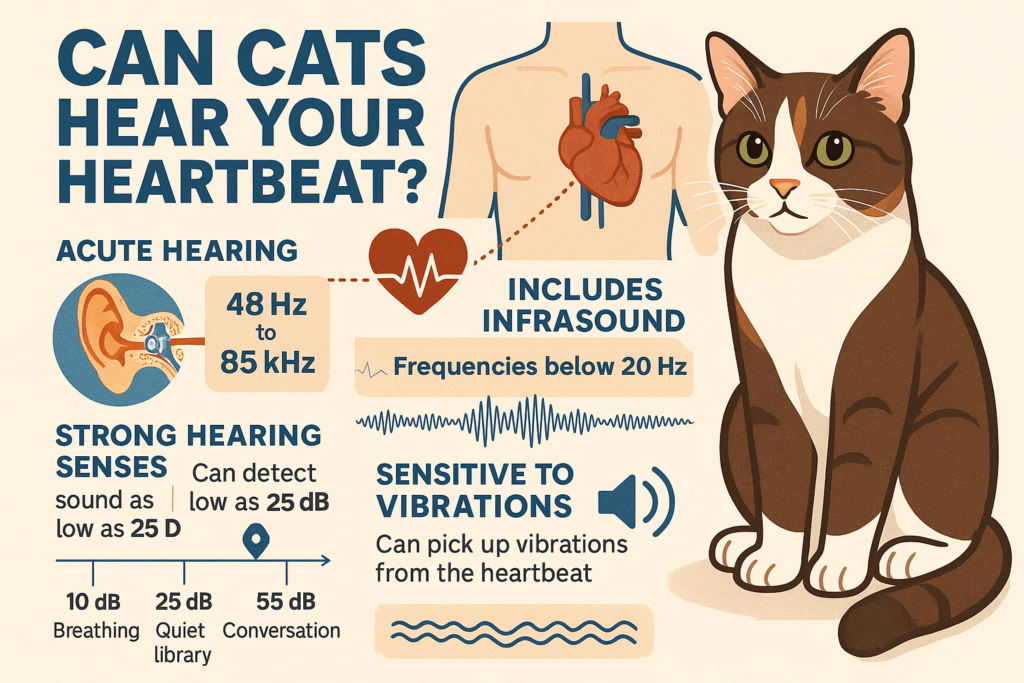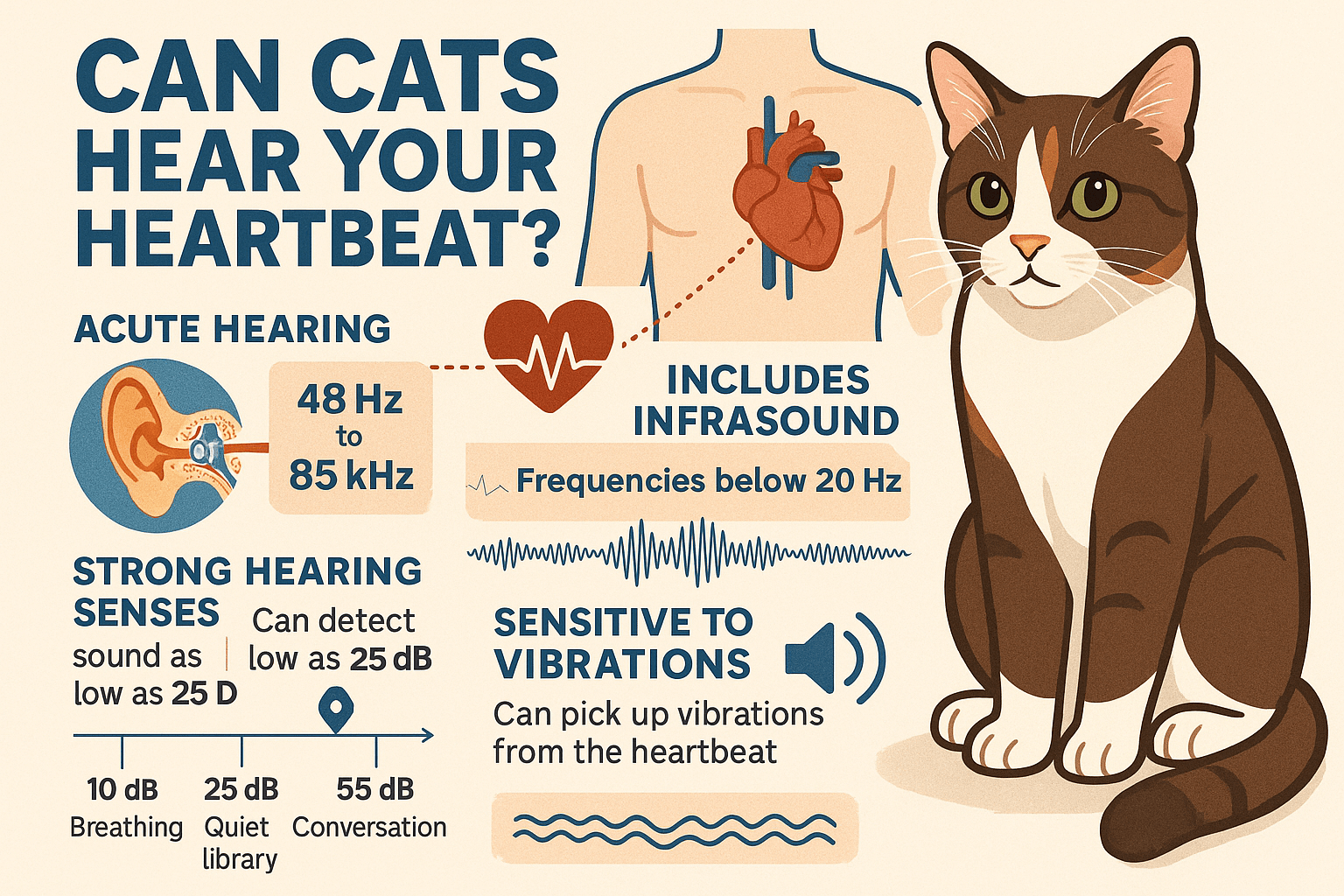Can Cats Hear Your Heartbeat?
Cats are known for their incredible sensory abilities, and their acute hearing is no exception. Whether it’s the faint rustle of a mouse or the soft hum of household appliances, cats can detect sounds far beyond the range of human perception. But what about something as subtle as a heartbeat? Can cats truly hear your heartbeat, and if so, how does this ability impact their behavior and bond with you? This blog post dives into the fascinating world of feline auditory capabilities, exploring the science behind their sharp hearing and what it means for your relationship with your furry companion.
The Science Behind a Cat’s Hearing Abilities
Cats possess one of the most advanced auditory systems in the animal kingdom, allowing them to detect frequencies and sounds that humans cannot perceive. Here’s how their hearing works and why it’s so remarkable.
Frequency Range:
Cats can hear frequencies between 45 Hz and 64,000 Hz, compared to humans who can only hear up to 20,000 Hz. This wide range enables them to pick up on ultrasonic sounds.Highly Sensitive Ears:
A cat’s ears are equipped with over 30 muscles, allowing them to rotate nearly 180 degrees to pinpoint the source of a sound with precision.Low-Volume Detection:
Cats can detect sounds at volumes as low as -10 decibels, making them incredibly sensitive to even the faintest noises.Heartbeat Frequency:
The average human heartbeat produces sound vibrations at around 1 to 2 Hz, which may fall outside a cat’s audible range but could still be detected through vibrations.Behavioral Responses:
Cats often react to subtle sounds by tilting their heads or moving closer to investigate, showcasing their heightened awareness.
These unique adaptations highlight why cats are such skilled hunters and companions, capable of perceiving sounds we might never notice.

How Cats Perceive Human Heartbeats
While cats may not “hear” a heartbeat in the traditional sense, they can sense its presence through other means. Their sensitivity to vibrations and subtle cues allows them to connect deeply with their human companions.
Vibration Detection:
Cats can feel the rhythmic vibrations of a heartbeat when lying close to their owner, even if they can’t audibly hear it.Proximity Matters:
Physical closeness enhances a cat’s ability to sense your heartbeat, especially when resting on your chest or lap.Behavioral Indicators:
Cats often purr or knead when near their owner’s heartbeat, suggesting comfort and familiarity with the rhythm.Bonding Through Sound:
The steady beat of a heartbeat can mimic the sounds a kitten hears from its mother, fostering feelings of security and trust.Individual Differences:
Some cats may be more attuned to these sensations than others, depending on their personality and past experiences.
This connection underscores the deep bond between cats and their owners, rooted in sensory awareness and mutual comfort.
Check this guide 👉Cat Paws vs Dog Paws: Best 7 Expert Tips!
Check this guide 👉Dog Fleas vs Cat Fleas: Best 7 Health Tips!
Check this guide 👉Cat Vision vs Dog Vision: Best 7 Expert Tips!
Cat’s Auditory Capabilities | Human Auditory Limitations |
|---|---|
Detects frequencies up to 64,000 Hz | Limited to frequencies up to 20,000 Hz |
Hears ultrasonic sounds (e.g., mice) | Cannot perceive ultrasonic frequencies |
Sensitive to sounds as low as -10 dB | Requires louder sounds for detection |
Pinpoints sound sources with precision | Less accurate sound localization |
Reacts to subtle vibrations | Often misses faint environmental cues |
Signs Your Cat Is Responding to Your Heartbeat
Cats exhibit specific behaviors when they sense or feel your heartbeat, indicating their awareness of this subtle yet comforting rhythm. Look out for these signs during your time together.
Purring While Close to You:
If your cat starts purring while resting on your chest, they may be responding to the soothing vibrations of your heartbeat.Kneading Behavior:
Kneading is a sign of contentment and may indicate your cat associates your heartbeat with feelings of safety.Head Pressing Against You:
Cats often press their heads against areas where they can feel your heartbeat, seeking closeness and reassurance.Relaxed Body Language:
A calm, relaxed posture suggests your cat finds comfort in the steady rhythm of your heart.Following You Around:
Cats may follow you closely, drawn to the familiar and reassuring sounds or vibrations you emit.
These behaviors demonstrate how deeply connected cats are to their owners, thanks in part to their extraordinary sensory abilities.
Other Subtle Sounds Cats Can Detect
Beyond heartbeats, cats can perceive an array of subtle sounds that go unnoticed by humans. Their heightened awareness makes them exceptional companions and hunters alike.
Rodent Ultrasonic Calls:
Mice and rats communicate using ultrasonic frequencies that cats can easily detect, aiding their hunting instincts.Electrical Humming:
Cats often react to the faint hum of electronics or appliances, showing curiosity toward these otherwise silent noises.Footsteps from Afar:
Thanks to their directional hearing, cats can identify approaching footsteps long before humans notice them.Water Dripping:
Even the quietest drip from a faucet can grab a cat’s attention due to their sensitivity to water-related sounds.Insects Buzzing:
Cats can hear the high-pitched buzz of insects like mosquitoes, explaining their sudden bursts of interest in certain areas.
This heightened perception enriches a cat’s interaction with the world, making them both fascinating and intuitive creatures.
How Cats Use Their Hearing in the Wild
In the wild, a cat’s advanced hearing plays a critical role in survival, allowing them to thrive as skilled predators. These adaptations continue to influence their behavior today.
Locating Prey Accurately:
Cats use their directional hearing to locate prey hiding in tall grass or underbrush, ensuring successful hunts.Detecting Danger Early:
Their ability to hear distant threats gives them time to escape or prepare for defense.Hunting in Low Light:
Enhanced hearing compensates for poor visibility during nighttime hunts, relying on sound rather than sight.Communicating with Other Cats:
Felines use vocalizations and subtle sounds to communicate with each other, establishing territory or signaling distress.Adapting to Urban Environments:
Domesticated cats retain their wild instincts, using their hearing to navigate busy households and outdoor spaces effectively.
These traits highlight the evolutionary advantages of a cat’s remarkable auditory system.
Tips for Enhancing Your Cat’s Sensory Experience
You can support your cat’s natural instincts and enhance their sensory experience by creating opportunities for stimulation and enrichment.
Provide Scratching Posts:
Scratching posts allow cats to sharpen their claws and stretch, engaging both muscle memory and tactile senses.Play Interactive Games:
Toys that mimic prey movements activate their hunting instincts and keep their senses sharp.Introduce New Sounds Gradually:
Exposing your cat to new but gentle sounds, like wind chimes or soft music, stimulates their auditory curiosity.Create Quiet Spaces:
Offering a calm retreat helps reduce stress and lets your cat focus on subtle sounds without distractions.Encourage Exploration:
Rotate toys or rearrange furniture to pique your cat’s interest and encourage investigative behavior.
By nurturing their senses, you help your cat lead a happier, healthier life.
Common Misconceptions About Cat Hearing
There are several myths surrounding a cat’s hearing abilities that deserve clarification. Understanding the truth can deepen your appreciation for your feline friend.
Myth: Cats Can Hear Everything Humans Can:
While cats have superior hearing, they cannot detect certain lower-frequency sounds as well as humans.Myth: All Cats Love Loud Noises:
Most cats dislike loud or sudden noises, as they startle easily due to their sensitive ears.Myth: Heartbeat Detection Is Purely Auditory:
Cats rely on vibrations and proximity, not just sound, to detect heartbeats.Myth: Older Cats Lose All Hearing Ability:
While age-related hearing loss occurs, many senior cats retain partial hearing and adapt to changes.Myth: Cats Always React to Every Sound:
Cats may choose to ignore certain sounds based on context or prior experience.
Dispelling these misconceptions fosters a clearer understanding of your cat’s sensory world.
Frequently Asked Questions About Cats and Heartbeats
Can cats really hear a human heartbeat?
While cats may not hear the actual heartbeat sound, they can sense its vibrations when close to their owner.
Why do cats like resting on my chest?
Cats find the rhythmic sensation of a heartbeat comforting, reminding them of maternal care as kittens.
Do all cats respond to heartbeats similarly?
Not all cats show the same level of interest; individual personalities and experiences play a role.
Is it normal for my cat to knead while hearing my heartbeat?
Yes, kneading is a natural behavior linked to feelings of security and happiness, often triggered by the heartbeat’s rhythm.
How else does a cat’s hearing benefit them?
Their acute hearing helps them hunt prey, avoid danger, and stay attuned to changes in their environment.
Celebrating the Bond Between Cats and Their Owners
A cat’s ability to sense your heartbeat is just one example of the profound connection shared between humans and felines. Their extraordinary hearing and sensitivity to vibrations create moments of mutual comfort and trust, strengthening the bond you share. By understanding and appreciating their unique sensory abilities, we gain deeper insight into what makes cats such cherished companions. So the next time your cat curls up on your chest, take a moment to marvel at the magic of this silent yet powerful connection—it’s a testament to the beauty of interspecies relationships.
Cat Anaphylactic Shock Treatment Costs: Best 7 Expert Tips! – Learn about costs, treatments, and financial aid options to save your cat’s life.
Exocrine Pancreatic Insufficiency in Cats: Best 7 Tips! – Learn to spot symptoms, manage EPI effectively, and improve your cat’s quality of life with expert advice.
Cost of Dog Anaphylactic Shock Treatment: Best 7 Tips! – Learn about emergency costs, financial planning, and ways to manage expenses for your dog’s care.
Exocrine Pancreatic Insufficiency in Dogs: Best 7 Tips! – Learn to spot symptoms, manage EPI effectively, and improve your dog’s quality of life with expert guidance.





